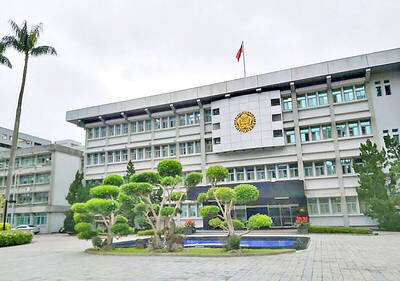Falun Gong members, Tibetan independence supporters and the Taiwan Solidarity Union (TSU) yesterday staged protests against Chinese officials who are in Taipei for a round of cross-strait negotiations, resulting in brief clashes with police.
Thwarted by tight security, none of them were able to get close to the Grand Hotel, where Association of Relations Across the Taiwan Straits (ARATS) Chairman Chen Yunlin (陳雲林) was staying.
The protests continued for a second straight day following Chen’s arrival on Wednesday, with the most intense demonstration taking place at the foot of the hill the hotel is on.
Three members of the Taiwan Tibetan Welfare Association, including its president, Dachompa Payama, clashed with the police at about 10:30am, when they tried to pass through the heavily guarded checkpoint before being pushed back.
Waving the Tibetan flag and chanting: “We want freedom,” “China out of Tibet now” and “Tibet belongs to the Tibetans,” the protesters demanded to meet Chen to force their point that China keep its hands off Tibet.
A total of 51 Tibetans have burned themselves to death since 2009 to protest against Chinese oppression, Dachompa said, adding that Tibetans in Taiwan could not sit on the sidelines and do nothing for their compatriots in China.
Dachompa also warned Taiwan’s government not to trust Beijing, because China had promised Tibet autonomy in the past.
“Why do you think so many Tibetans have set themselves ablaze? Taiwan has better watch out … it could become the second Tibet,” he said.
The Tibetans submitted a letter of appeal to Tien Chung-yung (田中勇), a representative of Taiwan’s Straits Exchange Foundation, before Greater Tainan Councilor Wang Ding-yu (王定宇) and Taipei City Councilor Tung Chung-yen (童仲彥), and Democratic Progressive Party (DPP) members did the same.
The DPP members demanded President Ma Ying-jeou’s (馬英九) government address a pair of recent issues involving China: the removal of Republic of China flags from an Olympics promotional event in London and the detention of Taiwanese Falun Gong practitioner Bruce Chung (鍾鼎邦).
Beyond the checkpoint, hundreds of Falun Gong members packed the sidewalks on Zhongshan N Road Sec 3 with members holding banners condemning Chinese oppression and demanding Beijing immediately release Chung.
Chung’s daughter, Chung Ai (鍾愛), said her mother, Lee Ya-min (李雅敏), on Wednesday met with her father in China’s Jianxi Province with the help of Chinese Nationalist Party (KMT) Legislator Alex Tsai (蔡正元) and that Bruce Chung appeared to be in good condition.
Chung Ai said she hoped the Ma administration would bring her father back as soon as possible.
Falun Gong Taiwan spokesperson Teresa Chu (朱婉琪) said the protest would continue throughout the night and today until the Chinese delegation leaves.
Meanwhile, about 50 protesters gathered in the Taipei Fine Art Museum for a TSU-organized protest yesterday. The TSU had to call off its protest at the hotel after its motorcade was stopped by the police.
Hsiao Kuan-yu (蕭貫譽), director of the TSU’s Department of Organization, asked the demonstrators to go to the hotel on foot.
About 10 protesters were later stopped by the police again on the Chungshan Bridge. Three TSU members who pretended to be tourists were able to get into the hotel briefly at about 1pm, but were immediately escorted out.

The German city of Hamburg on Oct. 14 named a bridge “Kaohsiung-Brucke” after the Taiwanese city of Kaohsiung. The footbridge, formerly known as F566, is to the east of the Speicherstadt, the world’s largest warehouse district, and connects the Dar-es-Salaam-Platz to the Brooktorpromenade near the Port of Hamburg on the Elbe River. Timo Fischer, a Free Democratic Party member of the Hamburg-Mitte District Assembly, in May last year proposed the name change with support from members of the Social Democratic Party and the Christian Democratic Union. Kaohsiung and Hamburg in 1999 inked a sister city agreement, but despite more than a quarter-century of

The Ministry of Foreign Affairs (MOFA) yesterday expressed “grave concerns” after Singaporean Prime Minister Lawrence Wong (黃循財) reiterated the city-state’s opposition to “Taiwanese independence” during a meeting with Chinese Premier Li Qiang (李強). In Singapore on Saturday, Wong and Li discussed cross-strait developments, the Singaporean Ministry of Foreign Affairs said in a statement. “Prime Minister Wong reiterated that Singapore has a clear and consistent ‘one China’ policy and is opposed to Taiwan independence,” it said. MOFA responded that it is an objective fact and a common understanding shared by many that the Republic of China (ROC) is an independent, sovereign nation, with world-leading

Temperatures in northern Taiwan are forecast to reach as high as 30°C today, as an ongoing northeasterly seasonal wind system weakens, the Central Weather Administration (CWA) said. CWA forecaster Tseng Chao-cheng (曾昭誠) said yesterday that with the seasonal wind system weakening, warmer easterly winds would boost the temperature today. Daytime temperatures in northern Taiwan and Yilan County are expected to range from 28°C to 30°C today, up about 3°C from yesterday, Tseng said. According to the CWA, temperature highs in central and southern Taiwan could stay stable. However, the weather is expected to turn cooler starting tonight as the northeasterly wind system strengthens again

The Ministry of Justice Investigation Bureau (MJIB) has been investigating nine shell companies working with Prince Holding Group, and the Taipei District Prosecutors’ Office is seeking further prosecution of alleged criminals, a source said yesterday. The nine companies and three Taiwanese nationals were named by the US Department of the Treasury’s Office of Foreign Assets Control (OFAC) on Oct. 14 as Specially Designated Nationals as a result of a US federal court indictment. Prince Holding founder Chen Zhi (陳志) has been charged with fraud, conspiracy, money laundering and overseeing Prince Holding’s suspected forced-labor camps in Cambodia, the indictment says. Intelligence shared between Taiwan,